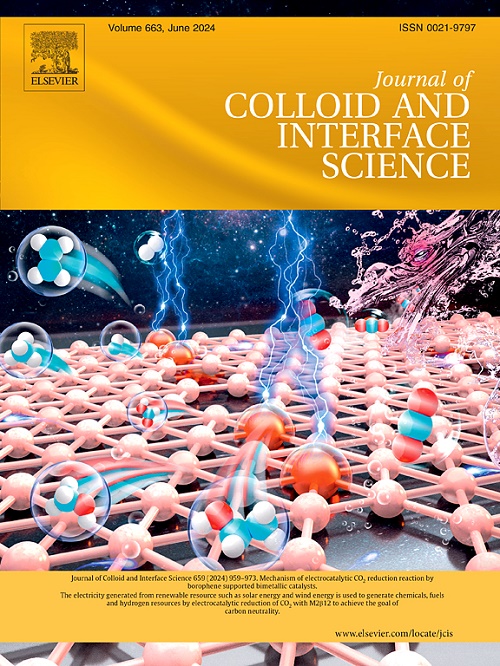竹纤维衍生碳载体对Pt纳米颗粒的固定化增强析氢反应。
IF 9.7
1区 化学
Q1 CHEMISTRY, PHYSICAL
引用次数: 0
摘要
生物质碳作为一种优良的载体,受到了广泛的关注。在本研究中,从竹纤维(BF)中获得的碳基质作为固定铂(Pt)纳米粒子的支撑材料,从而大大改善了析氢反应(HER)。这种方法利用了bf衍生碳的显著表面积、出色的导电性和环保特性,促进了Pt纳米颗粒的分散和稳定性。制备的催化剂具有优异的HER性能,在酸性溶液中,电流密度分别为10、50和100 mA cm-2时,过电位分别为14.6、46.9和73.5 mV。理论计算表明,载体材料中铂原子与氮原子的相互作用进一步提高了电催化性能。这种相互作用加强了Pt的结合,从而提高了催化剂的稳定性和活性,从而提高了电催化过程的效率。这些发现强调了增强型催化剂优越的HER性能,突出了可持续生物质衍生材料在推进催化应用方面的潜力。本文章由计算机程序翻译,如有差异,请以英文原文为准。

Bamboo fiber-derived carbon support for the immobilization of Pt nanoparticles to enhance hydrogen evolution reaction
Biomass-derived carbon, as an excellent support, has received extensive attention. In this work, carbon matrix obtained from bamboo fiber (BF) is served as a supporting material for the immobilization of platinum (Pt) nanoparticles, leading to a substantial improvement in the hydrogen evolution reaction (HER). This approach leverages the remarkable surface area, outstanding conductivity, and environmentally friendly characteristics of BF-derived carbon, facilitating the dispersion and stability of the Pt nanoparticles. The as-fabricated catalysts deliver an outstanding HER performance, with overpotentials of 14.6, 46.9, and 73.5 mV at current densities of 10, 50, and 100 mA cm−2 in acidic solution, respectively. Theoretical calculations reveal that the interaction between Pt and nitrogen atoms in the support material further enhances the electrocatalytic performance. This interaction strengthens the binding of Pt, leading to the improved stability and activity of the catalyst, which subsequently boosts the efficiency of the electrocatalytic process. These findings underscore the superior HER performance of the enhanced catalyst, highlighting the potential of sustainable, biomass-derived materials in advancing catalytic applications.
求助全文
通过发布文献求助,成功后即可免费获取论文全文。
去求助
来源期刊
CiteScore
16.10
自引率
7.10%
发文量
2568
审稿时长
2 months
期刊介绍:
The Journal of Colloid and Interface Science publishes original research findings on the fundamental principles of colloid and interface science, as well as innovative applications in various fields. The criteria for publication include impact, quality, novelty, and originality.
Emphasis:
The journal emphasizes fundamental scientific innovation within the following categories:
A.Colloidal Materials and Nanomaterials
B.Soft Colloidal and Self-Assembly Systems
C.Adsorption, Catalysis, and Electrochemistry
D.Interfacial Processes, Capillarity, and Wetting
E.Biomaterials and Nanomedicine
F.Energy Conversion and Storage, and Environmental Technologies

 求助内容:
求助内容: 应助结果提醒方式:
应助结果提醒方式:


